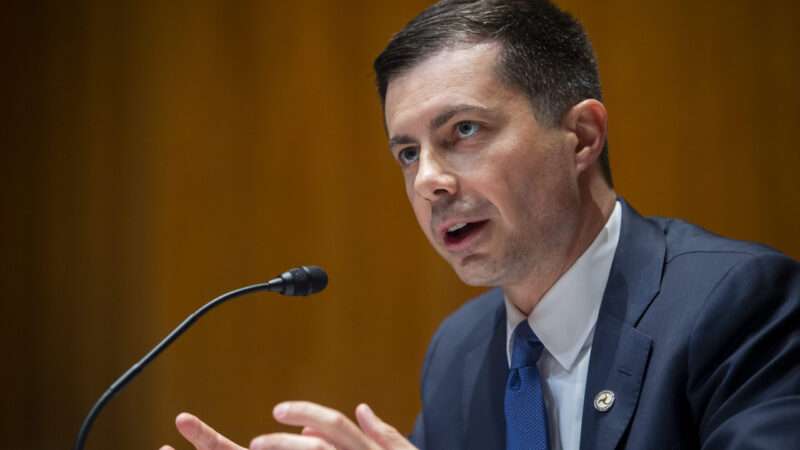
Transportation Secretary Pete Buttigieg, who ran for president in 2020 on his record as the mayor of South Bend, Indiana, is changing his official residence to Traverse City, Michigan, and will vote there.
Here's an idea worthy of the smart, innovative, bipartisan approach that got Buttigieg so much favorable attention during that presidential campaign: How about Buttigieg moves the Department of Transportation from Washington to Michigan with him? It would signal that the transportation future involves decentralization and rapid change rather than Washington-style command-and-control.
As of April 2022, of the department's 53,250 permanent and temporary employees, 7,599 of them were assigned to its headquarters. The Department of Transportation's main building is a 2 million square foot Washington, D.C., palace designed by celebrity architect Michael Graves and completed in 2009.
A bipartisan, if contrarian, consensus is emerging around the idea that not all these jobs, and others like them, need to be in high-cost Washington. Especially with the rise of remote work, it's increasingly feasible to put government jobs, and offices, in the heartland, where bureaucrats can be more in touch with middle America, and where taxpayers can save money by taking advantage of lower labor costs and real estate prices.
President Donald Trump's administration proposed moving about 20 percent of the FBI's Washington-based positions—2,306 of the bureau's roughly 10,606 Washington-based staff—to sites in Idaho, Alabama, and West Virginia.
A 2016 article by the center-left writer Matthew Yglesias for the left-leaning site Vox was headlined "Let's relocate a bunch of government agencies to the Midwest."
"Moving agencies out of the DC area to the Midwest would obviously cause some short-term disruptions," Yglesias wrote. "But in the long run, relocated agencies' employees would enjoy cheaper houses, shorter commutes, and a higher standard of living, while Midwestern communities would see their population and tax base stabilized and gain new opportunities for complementary industries to grow."
For an agency like the Department of Transportation, moving from Washington, D.C., to Michigan might be even more significant.
Think of four great revolutions in transportation in the past century and where they came from.
Malcolm McLean was a North Carolina truck driver who invented containerized shipping. The railroads accused him of violating the Interstate Commerce Act. Port administrators resisted the change. But the cost savings made goods cheaper for consumers and spurred international trade.
Herb Kelleher, co-founder of Southwest, started a new airline in Texas. He helped push the civil air deregulation championed by President Jimmy Carter, Sen. Edward Kennedy (D–Mass.) and his aide Stephen Breyer, and Cornell professor Alfred Kahn. Again, consumers benefited from the lower prices resulting from competition and choice.
Travis Kalanick, a Californian, began a ride-sharing service in San Francisco that became Uber. Taxi medallion owners and city governments fought it, but the service took advantage of smartphones, dynamic pricing, and the gig economy. Uber is now being attacked in a big investigation published by The Washington Post. The Post's owner, Jeff Bezos, is the founder of Amazon, which itself uses an Uber-like approach to deliveries, right down to boldly taking over New York City public street corners, like 72nd St. and Park Avenue, as package-sorting warehouse substations.
Elon Musk popularized the electric car with Tesla. Tesla, founded in California, relocated its corporate headquarters to Texas in 2021. One can criticize Tesla by saying it has benefited from taxpayer subsidies and government-caused high gasoline prices, and that it does a lot of business with communist China. The fact is, though, that the company has far outsold companies such as GM and what used to be Chrysler that were "rescued" by taxpayers during the George W. Bush and Barack Obama administrations.
What all four of these revolutions have in common is that not a single one of them started in Washington.
So if Mayor Pete—Secretary Pete—wants to play a constructive role in the transportation future, moving himself and the federal transportation bureaucracy out of the capital might be just the right move.
As for that existing headquarters building? It would make lovely condominiums, or private-sector office space. Maybe some future Uber, Tesla, or Southwest will want it to use as a kind of museum. It could help Congress understand that the solutions to America's transportation problems won't come from Washington bureaucrats but from unleashing the creativity of entrepreneurs in places like Texas and maybe even Traverse City.
The post Pete Buttigieg Is Moving to Michigan. He Should Take the Transportation Department With Him. appeared first on Reason.com.







